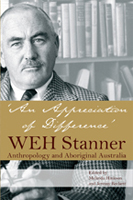An appreciation of difference: WEH Stanner and Aboriginal Australia
Summary
WEH Stanner was a public intellectual whose work reached beyond the walls of the academy, and he remains a highly significant figure in Aboriginal affairs and Australian anthropology. Educated by Radcliffe-Brown in Sydney and Malinowski in London, he undertook anthropological work in Australia, Africa and the Pacific.
Stanner contributed much to public understandings of the Dreaming and the significance of Aboriginal religion. His 1968 broadcast lectures, After the Dreaming, continue to be among the most widely quoted works in the field of Aboriginal studies. He also produced some exceptionally evocative biographical portraits of Aboriginal people. Stanner’s writings on post-colonial development and assimilation policy urged an appreciation of Indigenous people’s distinctive world views and aspirations.
Hinkson and Beckett have drawn together some of Australia’s leading academics working in Aboriginal studies to provide an historical and analytical context for Stanner’s work, as well as demonstrating the continuing relevance of his writings in the contested field of Aboriginal affairs.
Information about purchasing ASP’s ebooks.
Reviews and endorsements
'…the chapters of this volume flow with remarkable grace through personal and institutional history, anthropological reflections on land and religion, and assessments of what it meant in the middle years of the last century to be an anthropologist and a public intellectual...The authors — significant scholars themselves — have done him proud. They reflect in diverse ways on his legacy — and also on what has happened since. Events go backwards as well as forward. We are not done yet, nor is his vision, nor is his professional hesitation. I congratulate you, editors, authors and publisher!'
— Professor Marilyn Strathern, University of Cambridge
'[Stanner] was a humanist with a great regard for Aboriginal people and their traditions when most Australians despised Aborigines and were ready to send vigilante parties after them. So why the belated interest in his work? Was it that he was being dragooned into serving as some ideological symbol of the golden age of Aboriginal policy, or perhaps even the symbol of a correct approach? Or even as the father of a current school of thought to which attention should be drawn? There are inklings of this in some of the essays in An appreciation of difference but their importance is in the consideration given to his distinguished career and the historical and political circumstances in which he worked, often against the grain.
If a few of the modern anthropologists can rightly claim to have inherited Stanner's mantle, then it is in these humanist, scholarly essays by Sutton, Morphy, Beckett, Nancy Williams, Keen, the great prehistorian John Mulvaney and several others that we see the value of the discipline in understanding Australian life and the accommodation with the first Australians. The ‘sightlessness’ of Australians of which Stanner wrote so eloquently has perhaps been cured a little, as they look at themselves looking at us.'
— Marcia Langton, The Australian, Chronicler of a Disaster Foretold, 4 March 2009
'An appreciation of difference is an intelligent collection of articles which critically examines his life and legacy. The very different scale and scope of each contribution offers a welcome variety, not often found in such volumes. Some delve into the theoretical underpinnings of Stanner’s scholarly work. Other articles, typically written by those who worked with him, take more a personal approach. The selections are wide-ranging enough to avoid the descent into hagiography.'
— Daniel Oakman, The Canberra Times,14 March 2009
'There is an urgent need for Australian stories like Stanner’s to be taken to the broadest audience possible — such stories are the best and truest response to those who hide so nervously behind the argument that white fellas whishing to engage with Aboriginal people and their culture are motivated by guilt and "the black armband view" of Australian history.'
— Martin Flanagan, Sydney Morning Herald, 28–29 March 2009
'The achievement of the authors who have contributed to An Appreciation of Difference is to demonstrate how the principles of continuity and change apply equally to the life and work of this great public intellectual, WEH Stanner, himself.'
— Will Owen, Aboriginal Art & Culture, 26 April 2009
'The intellectual sinew running through the whole collection, as it did through Stanner's life as a thinker, is the struggle to distinguish continuity and change in the restless flow of experienced life. Stanner knew that what matters most is not structure but the unstable web of present meanings we call culture; not some imagined stasis but the daily flow of action. Theoretically and politically he was on the side of change and of choice.
An appreciation of difference neatly unwinds the dragon throttling the biographical enterprise: the temptation to impose one or another stock narrative on a problematic human life. It offers instead a magnificent array of information, insights, analyses, evaluations: multiple takes on a multiple man. But be warned. If you pick it up, it will eat at least a month of your life.'
— Olga Clendinnen, The Monthly, No. 44, April 2009
'Beckett and Hinkson provide a critical a critical piece which initiates the totality of Stanner’s life and his legacy. Their essay is followed by seventeen critical pieces dealing with the diverse fields which Stanner encountered throughout his life — both academic and anthropological…Each of these pieces must be read and I can hardly do justice to them in this short review.'
— Aram A Yengoyan, Oceania, Vol. 79, No. 2, July 2009
